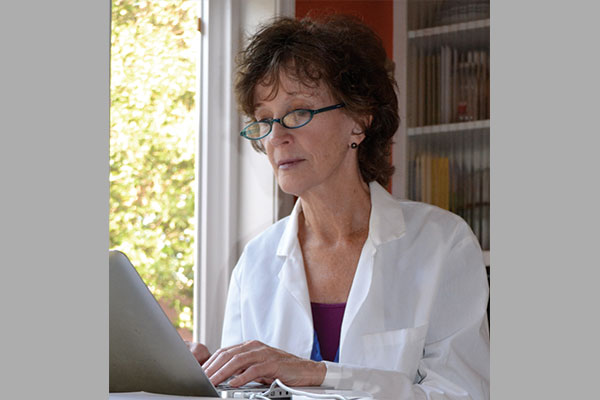On the Other Side of the Diagnosis
by Mary-Jo Murphy, MS, RN, CDE
“I am a nurse,” I say to the surgeon, as if that explains that he can be different with me, less guarded, more frank. I’m trying to tell him, I will understand your jargon. Skip the euphemisms. In fact, I will be alert for anything that smacks of not telling the whole truth.
“And,” I add as he pulls up a stool and sits at eye level across from me, “I was married to a general surgeon for 20 years.”
“I’m sorry,” he says with a laugh. His response relaxes me. I can tell he wants me to trust him.
I’d rather be with my ex-husband’s partner, someone whose skills I know, but Stu is four hundred miles away. So I ask the questions I’m sure my surgeon is expecting. His credentials? I’m impressed. He trained at a major university. He’s been in practice for three decades. He’s board certified. All this means something to me.
I believe he can handle my care, remove my hemorrhoid turned polyp. This is no biggie for him.
After his brief exam, I feel even more reassured. “It’s soft. It doesn’t feel malignant,” he says with confidence. Minutes before, in the waiting room, I’d prayed and prayed, “Please let this all turn out to be nothing.”
Maybe it is nothing. He feels these things all the time. I sigh and feel some further relief. I take a deep breath and allow myself to smile. The biopsy result that we wait for now is just a formality, isn’t it?
From this moment, from the speaking of those words, nothing will ever be the same for me.
Moments later, as he stares at my report, his face is suddenly devoid of the professional composure that doctors are so practiced at. I know from his shocked expression that it isn’t nothing.
“I can’t believe it,” he says staring at the paper. “It’s squamous cell carcinoma. You have anal cancer.”
I don’t ask him to repeat my diagnosis. I’ve seen too much to ask the usual questions: Are you sure? Why me? My mind is replete with the experiences of people with cancer whom I’ve cared for. Denial has been trained out of me. Disbelief and terror are instantly transformed into the understanding that from this moment, from the speaking of those words, nothing will ever be the same for me.
Now, trapped inside a body with a diagnosis attached, the most unexpected thing happens. Without a conscious thought, words form into sentences that prioritize in an instant what my values are, what beliefs I took for granted.
“I have things to do,” I say as I picture my unpublished manuscripts, my unpainted paintings. “My sons still need me. They’re in their twenties, but they …”
The doctor finished my sentence, “They still want you there.” I nod.
Next I see my mother, healthy, still living alone. Our family doesn’t have cancer, I think. But I do.
“Maybe I won’t live to be as old as my mother,” I say. “She’s 92.”
“I’ll help you with this,” he responds.
Just this morning, I’d been a nurse, a diabetes educator with special skills. In my starched lab coat, I’d walked into the room of a perfect stranger and told him with three words that nothing would ever be the same: “You have diabetes.”
Like my surgeon, I’ve looked into the face of disbelief time and again, and like him, I’ve delivered a practiced response. “I understand how you feel,” I’d say, believing in my heart what I said was true.
Now I was on the other side. And I didn’t understand a thing.
Mary-Jo Murphy is a registered nurse, health and diabetes educator, freelance writer, and anal cancer survivor residing in Ventura, CA. Visit her at mary-jomurphy.org.
This article was published in Coping® with Cancer magazine, March/April 2012.


